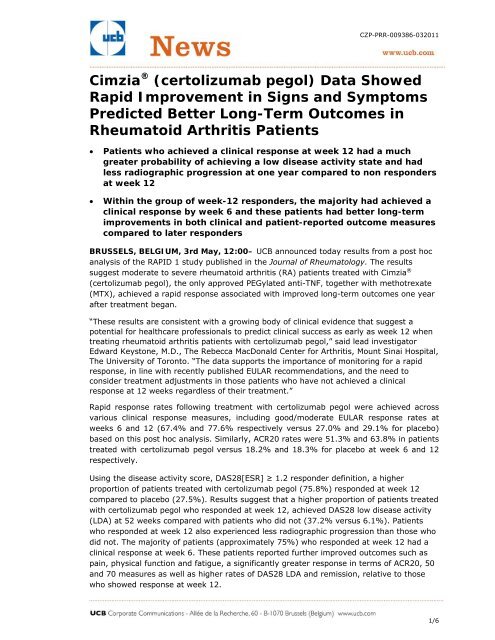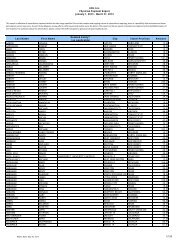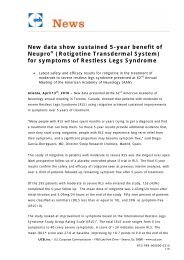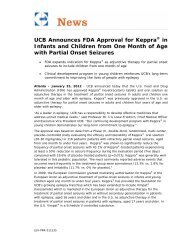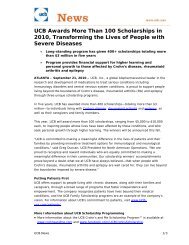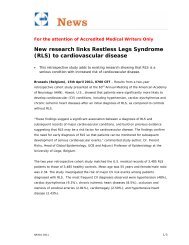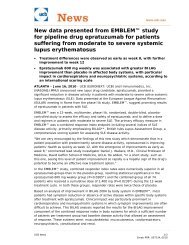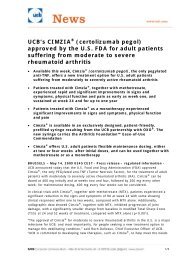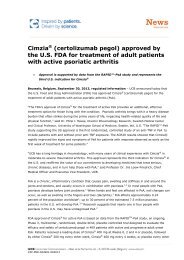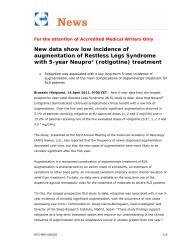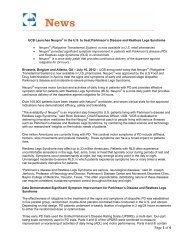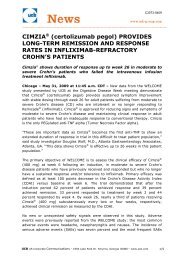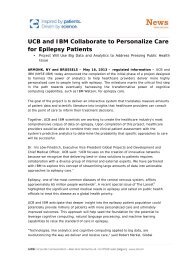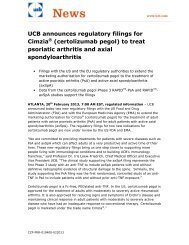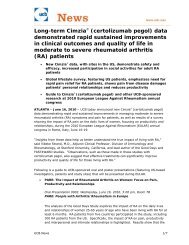Cimzia® (certolizumab pegol) Data Showed Rapid ... - UCB
Cimzia® (certolizumab pegol) Data Showed Rapid ... - UCB
Cimzia® (certolizumab pegol) Data Showed Rapid ... - UCB
Create successful ePaper yourself
Turn your PDF publications into a flip-book with our unique Google optimized e-Paper software.
CZP-PRR-009386-032011<br />
Cimzia ® (<strong>certolizumab</strong> <strong>pegol</strong>) <strong>Data</strong> <strong>Showed</strong><br />
<strong>Rapid</strong> Improvement in Signs and Symptoms<br />
Predicted Better Long-Term Outcomes in<br />
Rheumatoid Arthritis Patients<br />
<br />
<br />
Patients who achieved a clinical response at week 12 had a much<br />
greater probability of achieving a low disease activity state and had<br />
less radiographic progression at one year compared to non responders<br />
at week 12<br />
Within the group of week-12 responders, the majority had achieved a<br />
clinical response by week 6 and these patients had better long-term<br />
improvements in both clinical and patient-reported outcome measures<br />
compared to later responders<br />
BRUSSELS, BELGIUM, 3rd May, 12:00– <strong>UCB</strong> announced today results from a post hoc<br />
analysis of the RAPID 1 study published in the Journal of Rheumatology. The results<br />
suggest moderate to severe rheumatoid arthritis (RA) patients treated with Cimzia ®<br />
(<strong>certolizumab</strong> <strong>pegol</strong>), the only approved PEGylated anti-TNF, together with methotrexate<br />
(MTX), achieved a rapid response associated with improved long-term outcomes one year<br />
after treatment began.<br />
“These results are consistent with a growing body of clinical evidence that suggest a<br />
potential for healthcare professionals to predict clinical success as early as week 12 when<br />
treating rheumatoid arthritis patients with <strong>certolizumab</strong> <strong>pegol</strong>,” said lead investigator<br />
Edward Keystone, M.D., The Rebecca MacDonald Center for Arthritis, Mount Sinai Hospital,<br />
The University of Toronto. “The data supports the importance of monitoring for a rapid<br />
response, in line with recently published EULAR recommendations, and the need to<br />
consider treatment adjustments in those patients who have not achieved a clinical<br />
response at 12 weeks regardless of their treatment.”<br />
<strong>Rapid</strong> response rates following treatment with <strong>certolizumab</strong> <strong>pegol</strong> were achieved across<br />
various clinical response measures, including good/moderate EULAR response rates at<br />
weeks 6 and 12 (67.4% and 77.6% respectively versus 27.0% and 29.1% for placebo)<br />
based on this post hoc analysis. Similarly, ACR20 rates were 51.3% and 63.8% in patients<br />
treated with <strong>certolizumab</strong> <strong>pegol</strong> versus 18.2% and 18.3% for placebo at week 6 and 12<br />
respectively.<br />
Using the disease activity score, DAS28[ESR] ≥ 1.2 responder definition, a higher<br />
proportion of patients treated with <strong>certolizumab</strong> <strong>pegol</strong> (75.8%) responded at week 12<br />
compared to placebo (27.5%). Results suggest that a higher proportion of patients treated<br />
with <strong>certolizumab</strong> <strong>pegol</strong> who responded at week 12, achieved DAS28 low disease activity<br />
(LDA) at 52 weeks compared with patients who did not (37.2% versus 6.1%). Patients<br />
who responded at week 12 also experienced less radiographic progression than those who<br />
did not. The majority of patients (approximately 75%) who responded at week 12 had a<br />
clinical response at week 6. These patients reported further improved outcomes such as<br />
pain, physical function and fatigue, a significantly greater response in terms of ACR20, 50<br />
and 70 measures as well as higher rates of DAS28 LDA and remission, relative to those<br />
who showed response at week 12.<br />
1/6
CZP-PRR-009386-032011<br />
The data published were from the RAPID 1 study - a Phase III double-blind placebocontrolled<br />
trial. The trial was designed to establish the efficacy and tolerability of<br />
<strong>certolizumab</strong> <strong>pegol</strong> together with MTX, in the treatment of moderate to severely active RA<br />
in patients who did not adequately respond to conventional treatment. The co-primary end<br />
points were ACR20 score at week 24 and change in mTSS (modified Total Sharp Score) at<br />
week 52. The post hoc analysis focused on patients who received MTX and either 200mg<br />
subcutaneously or placebo every 2 weeks for 52 weeks accounting for 393 patients in the<br />
ITT population (30 patients were excluded due to nonimputable data).<br />
Patients participating in the trial all met the ACR classification for RA, and had active<br />
disease at screening and an inadequate response to MTX treatment (≥ 6 months with a<br />
stable dose of ≥ 10 mg weekly for ≥ 2 months prior to baseline).<br />
For the purpose of this post hoc analysis, patients were classified as responders or nonresponders<br />
based on DAS 28 > 1.2 and ACR20 response at week 6 and 12 respectively.<br />
Low disease activity was defined as DAS28 ≤ 3.2. Remission was defined as DAS28 ≤ 2.6.<br />
Improvement in disease activity, as measured by DAS28, was classified according to the<br />
EULAR response criteria.<br />
For further Information<br />
Scott Fleming, Global Communications Manager – Immunology<br />
T +44 770.277.7378, scott.fleming@ucb.com<br />
Andrea Levin, Senior PR Manager, US Communications and Public Relations<br />
T +1 770 970 8352, andrea.Levin@ucb.com<br />
IMPORTANT SAFETY INFORMATION<br />
Risk of Serious Infections and Malignancy<br />
Patients treated with <strong>certolizumab</strong> <strong>pegol</strong> are at an increased risk for developing serious<br />
infections that may lead to hospitalization or death. Most patients who developed these<br />
infections were taking concomitant immunosuppressants such as methotrexate or<br />
corticosteroids. Certolizumab Pegol should be discontinued if a patient develops a serious<br />
infection or sepsis. Reported infections include:<br />
Active tuberculosis, including reactivation of latent tuberculosis. Patients with<br />
tuberculosis have frequently presented with disseminated or extrapulmonary disease.<br />
Patients should be tested for latent tuberculosis before <strong>certolizumab</strong> <strong>pegol</strong> use and<br />
during therapy. Treatment for latent infection should be initiated prior to<br />
<strong>certolizumab</strong> <strong>pegol</strong> use.<br />
Invasive fungal infections, including histoplasmosis, coccidioidomycosis, candidiasis,<br />
aspergillosis, blastomycosis, and pneumocystosis. Patients with histoplasmosis or<br />
other invasive fungal infections may present with disseminated, rather than localized<br />
disease. Antigen and antibody testing for histoplasmosis may be negative in some<br />
patients with active infection. Empiric anti-fungal therapy should be considered in<br />
patients at risk for invasive fungal infections who develop severe systemic illness.<br />
Bacterial, viral and other infections due to opportunistic pathogens.<br />
The risks and benefits of treatment with <strong>certolizumab</strong> <strong>pegol</strong> should be carefully<br />
considered prior to initiating therapy in patients with chronic or recurrent infection.<br />
Patients should be closely monitored for the development of signs and symptoms of<br />
infection during and after treatment with <strong>certolizumab</strong> <strong>pegol</strong>, including the possible<br />
<strong>UCB</strong> News 2/6
CZP-PRR-009386-032011<br />
development of tuberculosis in patients who tested negative for latent tuberculosis<br />
infection prior to initiating therapy.<br />
Lymphoma and other malignancies, some fatal, have been reported in children and<br />
adolescent patients treated with TNF blockers, of which <strong>certolizumab</strong> <strong>pegol</strong> is a member.<br />
Certolizumab <strong>pegol</strong> is not indicated for use in pediatric patients.<br />
Serious and sometimes fatal infection due to bacterial, mycobacterial, invasive fungal, viral or other<br />
opportunistic pathogens has been reported in patients receiving TNF-blocking agents. Among<br />
opportunistic infections, tuberculosis, histoplasmosis, aspergillosis, candidiasis, coccidioidomycosis,<br />
listeriosis, and pneumocystosis were the most common. Treatment with <strong>certolizumab</strong> <strong>pegol</strong> should<br />
not be initiated in patients with an active infection, including clinically important localized infections.<br />
Certolizumab <strong>pegol</strong> should be discontinued if a patient develops a serious infection or sepsis.<br />
Patients who develop a new infection during treatment with <strong>certolizumab</strong> <strong>pegol</strong> should be closely<br />
monitored, undergo a prompt and complete diagnostic workup appropriate for immunocompromised<br />
patients, and appropriate antimicrobial therapy should be initiated. Appropriate empiric antifungal<br />
therapy should also be considered while a diagnostic workup is performed for patients who develop<br />
a serious systemic illness and reside or travel in regions where mycoses are endemic.<br />
Malignancies<br />
During controlled and open-labeled portions of <strong>certolizumab</strong> <strong>pegol</strong> studies of Crohn’s disease and<br />
other diseases, malignancies (excluding non-melanoma skin cancer) were observed at a rate of 0.5<br />
per 100 patient-years among 4,650 <strong>certolizumab</strong> <strong>pegol</strong>-treated patients versus a rate of 0.6 per 100<br />
patient-years among 1,319 placebo-treated patients. In studies of <strong>certolizumab</strong> <strong>pegol</strong> for Crohn’s<br />
disease and other investigational uses, there was one case of lymphoma among 2,657 <strong>certolizumab</strong><br />
<strong>pegol</strong>-treated patients and one case of Hodgkin lymphoma among 1,319 placebo-treated patients.<br />
In <strong>certolizumab</strong> <strong>pegol</strong> RA clinical trials (placebo-controlled and open label) a total of three cases of<br />
lymphoma were observed among 2,367 patients. This is approximately 2-fold higher than expected<br />
in the general population. Patients with RA, particularly those with highly active disease, are at a<br />
higher risk for the development of lymphoma. The potential role of TNF blocker therapy in the<br />
development of malignancies is not known.<br />
Malignancies, some fatal, have been reported among children, adolescents, and young adults who<br />
received treatment with TNF-blocking agents (initiation of therapy ≤18 years of age), of which<br />
<strong>certolizumab</strong> <strong>pegol</strong> is a member. Approximately half of the cases were lymphoma (including<br />
Hodgkin’s and non-Hodgkin’s lymphoma), while the other cases represented a variety of different<br />
malignancies and included rare malignancies associated with immunosuppression and malignancies<br />
not usually observed in children and adolescents. Most of the patients were receiving concomitant<br />
immunosuppressants.<br />
Cases of acute and chronic leukemia have been reported with TNF-blocker use. Even in the absence<br />
of TNF-blocker therapy, patients with RA may be at a higher risk (approximately 2-fold) than the<br />
general population for developing leukemia.<br />
Heart Failure<br />
<strong>UCB</strong> News 3/6
CZP-PRR-009386-032011<br />
Cases of worsening congestive heart failure (CHF) and new onset CHF have been reported with TNF<br />
blockers. Certolizumab <strong>pegol</strong> has not been formally studied in patients with CHF. Exercise caution<br />
when using <strong>certolizumab</strong> <strong>pegol</strong> in patients who have heart failure and monitor them carefully.<br />
Hypersensitivity<br />
Symptoms compatible with hypersensitivity reactions, including angioedema, dyspnea, hypotension,<br />
rash, serum sickness, and urticaria, have been reported rarely following <strong>certolizumab</strong> <strong>pegol</strong><br />
administration. If such reactions occur, discontinue further administration of <strong>certolizumab</strong> <strong>pegol</strong> and<br />
institute appropriate therapy.<br />
Hepatitis B Reactivation<br />
Use of TNF blockers, including <strong>certolizumab</strong> <strong>pegol</strong>, may increase the risk of reactivation of hepatitis<br />
B virus (HBV) in patients who are chronic carriers of this virus. Some cases have been fatal.<br />
Evaluate patients at risk for HBV infection for prior evidence of HBV infection before initiating<br />
<strong>certolizumab</strong> <strong>pegol</strong> therapy. Exercise caution in prescribing <strong>certolizumab</strong> <strong>pegol</strong> for patients<br />
identified as carriers of HBV, with careful evaluation and monitoring prior to and during treatment.<br />
In patients who develop HBV reactivation, discontinue <strong>certolizumab</strong> <strong>pegol</strong> and initiate effective antiviral<br />
therapy with appropriate supportive treatment.<br />
Neurologic Reactions<br />
Use of TNF blockers, including CIMZIA, has been associated with rare cases of new onset or<br />
exacerbation of clinical symptoms and/or radiographic evidence of central nervous system<br />
demyelinating disease, including multiple sclerosis, and with peripheral demyelinating disease,<br />
including Guillain-Barre syndrome. Rare cases of neurological disorders, including seizure disorder,<br />
optic neuritis, and peripheral neuropathy have been reported in patients treated with CIMZIA.<br />
Exercise caution in considering the use of CIMZIA in patients with these disorders.<br />
Hematologic Reactions<br />
Rare reports of pancytopenia, including aplastic anemia, have been reported with TNF blockers.<br />
Medically significant cytopenia (e.g., leukopenia, pancytopenia, thrombocytopenia) has been<br />
infrequently reported with <strong>certolizumab</strong> <strong>pegol</strong>. Advise all patients to seek immediate medical<br />
attention if they develop signs and symptoms suggestive of blood dyscrasias or infection (e.g.,<br />
persistent fever, bruising, bleeding, pallor) while on <strong>certolizumab</strong> <strong>pegol</strong>. Consider discontinuation of<br />
<strong>certolizumab</strong> <strong>pegol</strong> therapy in patients with confirmed significant hematologic abnormalities.<br />
Drug Interactions<br />
An increased risk of serious infections has been seen in clinical trials of other TNF blocking agents<br />
used in combination with anakinra or abatacept. Formal drug interaction studies have not been<br />
performed with rituximab or natalizumab; however because of the nature of the adverse events<br />
seen with these combinations with TNF blocker therapy, similar toxicities may also result from the<br />
use of <strong>certolizumab</strong> <strong>pegol</strong> in these combinations. Therefore, the combination of <strong>certolizumab</strong> <strong>pegol</strong><br />
with anakinra, abatacept, rituximab, or natalizumab is not recommended. Interference with certain<br />
coagulation assays has been detected in patients treated with <strong>certolizumab</strong> <strong>pegol</strong>. There is no<br />
evidence that <strong>certolizumab</strong> <strong>pegol</strong> therapy has an effect on in vivo coagulation. Certolizumab <strong>pegol</strong><br />
may cause erroneously elevated aPTT assay results in patients without coagulation abnormalities.<br />
<strong>UCB</strong> News 4/6
CZP-PRR-009386-032011<br />
Autoimmunity<br />
Treatment with <strong>certolizumab</strong> <strong>pegol</strong> may result in the formation of autoantibodies and, rarely, in the<br />
development of a lupus-like syndrome. Discontinue treatment if symptoms of lupus-like syndrome<br />
develop.<br />
Immunizations<br />
Do not administer live vaccines or attenuated vaccines concurrently with <strong>certolizumab</strong> <strong>pegol</strong>.<br />
Adverse Reactions<br />
In controlled Crohn’s clinical trials, the most common adverse events that occurred in ≥5% of<br />
<strong>certolizumab</strong> Pegol patients (n=620) and more frequently than with placebo (n=614) were upper<br />
respiratory infection (20% <strong>certolizumab</strong> <strong>pegol</strong>, 13% placebo), urinary tract infection (7%<br />
<strong>certolizumab</strong> <strong>pegol</strong>, 6% placebo), and arthralgia (6% <strong>certolizumab</strong> <strong>pegol</strong>, 4% placebo). The<br />
proportion of patients who discontinued treatment due to adverse reactions in the controlled clinical<br />
studies was 8% for <strong>certolizumab</strong> <strong>pegol</strong> and 7% for placebo.<br />
In controlled RA clinical trials, the most common adverse events that occurred in ≥ 3% of patients<br />
taking <strong>certolizumab</strong> <strong>pegol</strong> 200mg every other week with concomitant methotrexate (n=640) and<br />
more frequently than with placebo with concomitant methotrexate (n=324) were upper respiratory<br />
tract infection (6% <strong>certolizumab</strong> <strong>pegol</strong>, 2% placebo), headache (5% <strong>certolizumab</strong> <strong>pegol</strong>, 4%<br />
placebo), hypertension (5% <strong>certolizumab</strong> <strong>pegol</strong>, 2% placebo), nasopharyngitis (5% <strong>certolizumab</strong><br />
<strong>pegol</strong>, 1% placebo), back pain (4% <strong>certolizumab</strong> <strong>pegol</strong>, 1% placebo), pyrexia (3% <strong>certolizumab</strong><br />
<strong>pegol</strong>, 2% placebo), pharyngitis (3% <strong>certolizumab</strong> <strong>pegol</strong>, 1% placebo), rash (3% <strong>certolizumab</strong><br />
<strong>pegol</strong>, 1% placebo), acute bronchitis (3% <strong>certolizumab</strong> <strong>pegol</strong>,1% placebo), fatigue (3%<br />
<strong>certolizumab</strong> <strong>pegol</strong>, 1% placebo). Hypertensive adverse reactions were observed more frequently in<br />
patients receiving <strong>certolizumab</strong> <strong>pegol</strong> than in controls. These adverse reactions occurred more<br />
frequently among patients with a baseline history of hypertension and among patients receiving<br />
concomitant corticosteroids and nonsteroidal anti-inflammatory drugs. Patients receiving<br />
<strong>certolizumab</strong> <strong>pegol</strong> 400mg as monotherapy every 4 weeks in RA controlled clinical trials had similar<br />
adverse reactions to those patients receiving <strong>certolizumab</strong> <strong>pegol</strong> 200mg every other week. The<br />
proportion of patients who discontinued treatment due to adverse reactions in the controlled clinical<br />
studies was 5% for <strong>certolizumab</strong> <strong>pegol</strong> and 2.5% for placebo.<br />
Please see full prescribing information at www.cimzia.com before prescribing.<br />
About CIMZIA ®<br />
Cimzia ® is the only PEGylated anti-TNF (Tumor Necrosis Factor). Cimzia ® has a high affinity for<br />
human TNF-alpha, selectively neutralizing the pathophysiological effects of TNF-alpha. Over the past<br />
decade, TNF-alpha has emerged as a major target of basic research and clinical investigation. This<br />
cytokine plays a key role in mediating pathological inflammation, and excess TNF-alpha production<br />
has been directly implicated in a wide variety of diseases. The U.S. Food and Drug Administration<br />
(FDA) has approved Cimzia ® for reducing signs and symptoms of Crohn's disease and maintaining<br />
clinical response in adult patients with moderately to severely active disease who have had an<br />
inadequate response to conventional therapy and for the treatment of adults with moderately to<br />
severely active rheumatoid arthritis. Cimzia ® in combination with MTX, is approved in the EU for the<br />
treatment of moderate to severe active RA in adult patients inadequately responsive to diseasemodifying<br />
antirheumatic drugs (DMARDs) including MTX. Cimzia ® can be given as monotherapy in<br />
<strong>UCB</strong> News 5/6
CZP-PRR-009386-032011<br />
case of intolerance to MTX or when continued treatment with MTX is inappropriate. <strong>UCB</strong> is also<br />
developing Cimzia ® in other autoimmune disease indications. Cimzia ® is a registered trademark of<br />
<strong>UCB</strong> PHARMA S.A.<br />
About <strong>UCB</strong><br />
<strong>UCB</strong>, Brussels, Belgium (www.ucb.com) is a biopharmaceutical company dedicated to the research,<br />
development and commercialization of innovative medicines with a focus on the fields of central<br />
nervous system and immunology disorders. Employing more than 9000 people in over 40 countries,<br />
<strong>UCB</strong> produced revenue of EUR 3.22 billion in 2010. <strong>UCB</strong> is listed on Euronext Brussels (symbol:<br />
<strong>UCB</strong>).<br />
Forward-looking statements<br />
This press release contains forward-looking statements based on current plans, estimates and<br />
beliefs of management. Such statements are subject to risks and uncertainties that may cause<br />
actual results to be materially different from those that may be implied by such forward-looking<br />
statements contained in this press release. Important factors that could result in such differences<br />
include: changes in general economic, business and competitive conditions, effects of future judicial<br />
decisions, changes in regulation, exchange rate fluctuations and hiring and retention of its<br />
employees.<br />
<strong>UCB</strong> News 6/6


